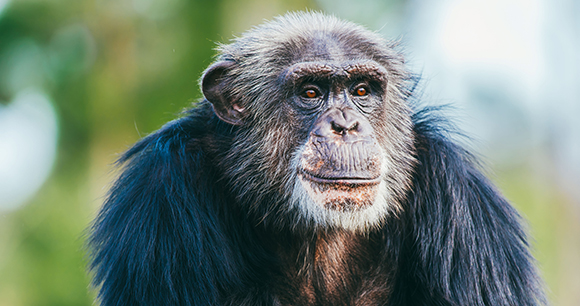NIH Keeps Chimps in Limbo at Alamogordo
The Chimpanzee Health, Improvement, Maintenance and Protection (CHIMP) Act requires all federally owned chimpanzees retired from research to be moved to a federally operated sanctuary, such as Chimp Haven, near Shreveport, Louisiana. Despite this, 26 such chimpanzees remain behind at the National Institutes of Health’s Alamogordo Primate Facility (APF) in New Mexico.

The NIH refuses to relocate these last 26 under the pretext that they are too fragile. In 2022, a federal court ruled this refusal to be unlawful. The NIH filed an appeal, but withdrew it in March 2024. And yet, the agency was quoted the following month in the Santa Fe New Mexican to say it still has “no imminent plan” to move them. In its 2022 ruling, the court stated in a footnote that the parties had agreed the “NIH is not obligated to transfer a ‘moribund’ chimpanzee.” As discussed in the New York Times, most understand the term “moribund” to mean “near death,” but the NIH defines it as experiencing “life-threatening, systemic disease that poses a constant threat and could result in abrupt death.” It relies on this alternate definition to justify its unwillingness to move chimpanzees with certain chronic diseases, even if they may live for many more years.
In an apparent conflict of interest, the determination that the chimpanzees are not fit for relocation was made by a veterinarian working for Charles River Laboratories (CRL)—the very company being paid to care for them at the APF. Because these chimpanzees are the only remaining animals at the APF, moving them to a sanctuary would presumably shutter the facility and result in CRL losing a lucrative and longstanding contract.
A panel of NIH veterinarians corroborated the CRL veterinarian’s determination, but its review was based on documents supplied by the facility; the panel did not examine any of the chimpanzees in person. The following year, two independent evaluations—one by an outside primatologist and another by a longtime primate veterinarian who did visit the chimpanzees—disputed the NIH’s conclusion; they concluded instead that transfer to a sanctuary would likely benefit the animals significantly. Adding insult to injury, the cost to taxpayers of caring for these chimpanzees at the APF is nearly 2.5 times greater than it would be at Chimp Haven.
Program Terms: Animals in Laboratories, Terrestrial Wildlife
AWI Quarterly Terms: Government/Legal, Quick Read
Related News
IUCN Reaffirms Long-Tailed Macaques’ Endangered Status Despite Industry Pressure
In Program: Terrestrial WildlifeThe International Union for Conservation of Nature (IUCN) today released an update to its Red List of Threatened Species. The update revealed that the long-tailed...
New Analysis: Animal Welfare Act Enforcement Deteriorates Following SCOTUS Ruling
In Program: Animals in LaboratoriesThe US Department of Agriculture, long known for its lackluster enforcement of the Animal Welfare Act (AWA), appears in recent years to have drifted even...
AWI Funds Research to Alleviate Human-Wildlife Conflicts, Animal Suffering
In Program: Terrestrial WildlifeThe Animal Welfare Institute (AWI) announced today the eight recipients of its Christine Stevens Wildlife Award who are developing humane solutions to human-wildlife conflicts and...
Refuge from Cruel Trapping Act Reintroduced to Protect Wildlife and Pets on Public Lands
In Program: Companion Animals, Terrestrial WildlifeThe Animal Welfare Institute (AWI) endorses the Refuge from Cruel Trapping Act, reintroduced today in the US House of Representatives by Rep. Jerrold Nadler (D-NY)....